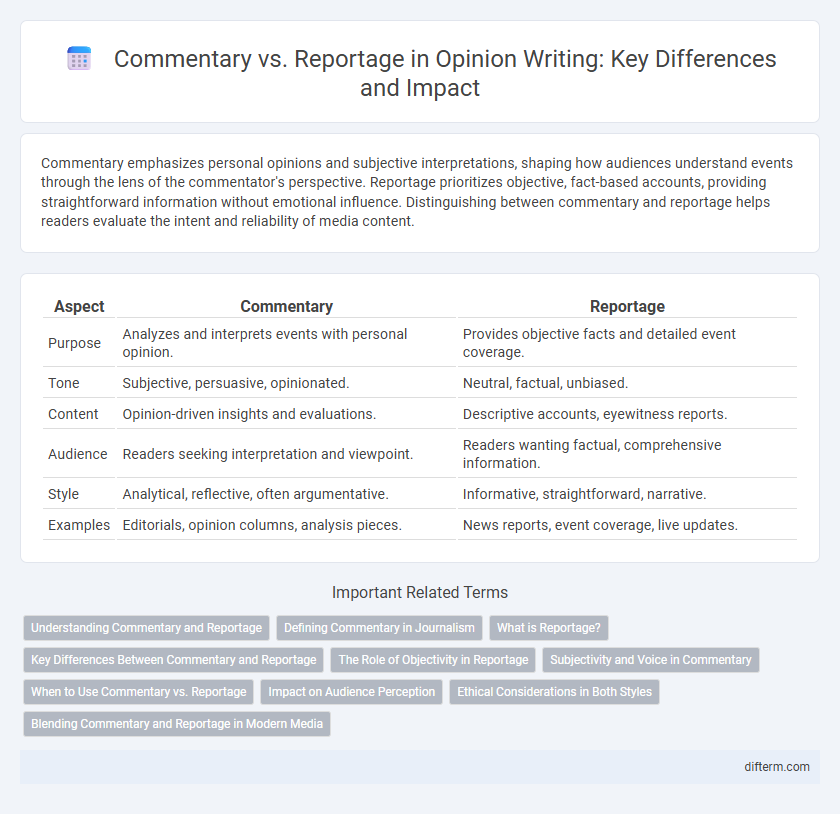Commentary emphasizes personal opinions and subjective interpretations, shaping how audiences understand events through the lens of the commentator's perspective. Reportage prioritizes objective, fact-based accounts, providing straightforward information without emotional influence. Distinguishing between commentary and reportage helps readers evaluate the intent and reliability of media content.
Table of Comparison
| Aspect | Commentary | Reportage |
|---|---|---|
| Purpose | Analyzes and interprets events with personal opinion. | Provides objective facts and detailed event coverage. |
| Tone | Subjective, persuasive, opinionated. | Neutral, factual, unbiased. |
| Content | Opinion-driven insights and evaluations. | Descriptive accounts, eyewitness reports. |
| Audience | Readers seeking interpretation and viewpoint. | Readers wanting factual, comprehensive information. |
| Style | Analytical, reflective, often argumentative. | Informative, straightforward, narrative. |
| Examples | Editorials, opinion columns, analysis pieces. | News reports, event coverage, live updates. |
Understanding Commentary and Reportage
Commentary offers subjective analysis and personal opinions that shape audience interpretation, while reportage prioritizes factual accuracy and unbiased presentation of events. Understanding the distinction helps readers critically evaluate media sources and identify potential biases in information delivery. Clear differentiation between these formats enhances media literacy and promotes informed consumption of news content.
Defining Commentary in Journalism
Commentary in journalism provides analysis, interpretation, and personal viewpoints on news events, distinguishing itself from objective reportage that strictly presents facts. It aims to offer insights, provoke thought, and influence public opinion through subjective evaluation and contextual understanding. By blending information with opinion, commentary deepens readers' engagement and fosters critical discourse on current affairs.
What is Reportage?
Reportage is a journalistic method centered on delivering factual, firsthand accounts of events with precise details and objective observations. It prioritizes accuracy, timeliness, and neutrality to inform the audience without personal bias or interpretation. This approach contrasts with commentary, which emphasizes analysis and subjective opinions.
Key Differences Between Commentary and Reportage
Commentary interprets and analyzes events, offering subjective opinions and insights that guide audience perception. Reportage focuses on unbiased, factual presentation of news, emphasizing accuracy and neutrality without personal viewpoints. The key difference lies in commentary's evaluative approach versus reportage's objective delivery of information.
The Role of Objectivity in Reportage
Reportage demands strict adherence to objectivity, ensuring facts are presented without personal bias or interpretation. This commitment to neutrality distinguishes reportage from commentary, where subjective viewpoints shape the narrative. Maintaining objectivity in reportage fosters trust, credibility, and informed public discourse.
Subjectivity and Voice in Commentary
Commentary emphasizes subjectivity by incorporating the author's personal insights, emotions, and interpretations, offering a distinctive voice that shapes the narrative. Unlike reportage, which strives for impartiality and factual accuracy, commentary invites readers to engage with the commentator's perspective, often provoking reflection or debate. The presence of a strong, identifiable voice in commentary enhances its persuasive power and cultural relevance.
When to Use Commentary vs. Reportage
Commentary is best used when interpreting events, providing analysis, and expressing subjective viewpoints to influence or inform public opinion. Reportage serves to deliver objective, fact-based accounts of events without personal bias, ensuring readers receive accurate and trustworthy information. Choosing between commentary and reportage depends on the need for either critical insight or straightforward news delivery.
Impact on Audience Perception
Commentary shapes audience perception by providing analysis and personal viewpoints that influence opinions and emotional responses. In contrast, reportage offers factual, unbiased accounts that promote informed understanding and critical thinking. The impact of commentary often leads to heightened engagement and advocacy, while reportage encourages objective evaluation of events.
Ethical Considerations in Both Styles
Commentary and reportage demand rigorous ethical standards to maintain credibility and trust. Commentary requires transparent disclosure of biases while avoiding misinformation, ensuring opinions are grounded in factual accuracy. Reportage prioritizes impartiality and thorough fact-checking to provide audiences with reliable, unbiased accounts of events.
Blending Commentary and Reportage in Modern Media
Blending commentary and reportage in modern media enhances storytelling by providing both factual information and insightful analysis, creating a richer audience experience. This hybrid approach leverages real-time reporting with interpretive perspectives, fostering deeper engagement and critical thinking. Media outlets that skillfully integrate these elements meet the growing demand for context-driven news in an era of information overload.
commentary vs reportage Infographic

 difterm.com
difterm.com